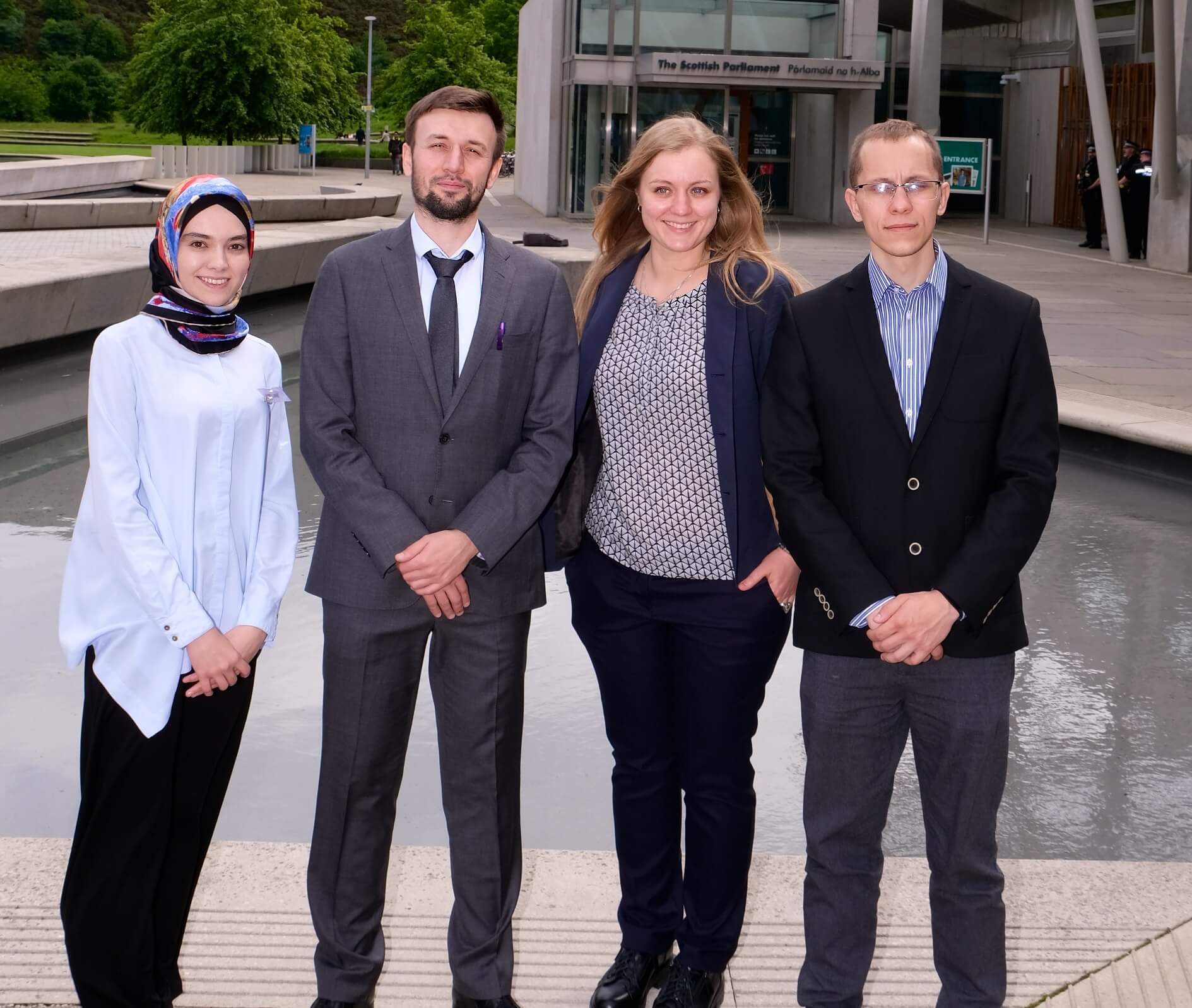Supporting Mental Health in Russia

(Photo: Artem Novikov, far right of the picture, in front of the Scottish Parliament in Edinburgh with his fellow John Smith Trust Fellows from Russia)
Dr Artem Novikov (JST 2019) is a Moscow-based psychiatrist specialising in children and adolescents. As well as having his own practice, he also works for the Centre for Curative Pedagogics (CCP) as their government relations manager. The Centre is one of the most influential NGOs working in the field of handicap and mental health in Russia.
The flourishing of social media has brought discussions of mental health – and struggles with it – much more into the open these days in Russia. While this is a far cry from the almost complete silence around talk of mental health during Soviet times, Artem believes the majority of people are still unwilling to talk openly about such issues or even admit their problems. From his perspective, the continued silence and stigma are directly connected to the lack of evidence-based treatments and services available to the majority of the Russian population.
Artem had long wanted to go beyond his medical training and learn more about the approach and attitude to handicap and mental health in other countries. He was confident in the support he could give to families and clients within the confines of his own office but for those needing further support from the state, he felt helpless to assist with the reality of navigating the system of poor services provided. All mental health issues in Russia fall under the umbrella of Psychiatric Services which, although developing towards more modern models and principles, still have much catching up to do with global norms of evidence-based medicine.
In 2019, Artem heard about the opportunity of the John Smith Trust Fellowship Programme by chance through a mutual connection. He felt it an ideal opportunity to develop the first steps of his long term goal to improve the quality of life of children and young adults with mental health issues in Russia through tackling the lack of evidence-based treatments and raising awareness. He hoped he would be able to better understand the UK’s use of evidence based treatments – and bring that knowledge home with him.
A number of meetings were arranged for Artem during his month in the UK with outstanding UK organisations working in the field of mental health. These included the Anna Freud National Centre for Children and Families, Mind / Time to Change, Minds Ahead and the Mental Health Foundation Scotland. Artem cites a meeting with Neil Guy of the Children and Young People’s Mental Health Task Force in Scotland as ‘eye opening’ where he understood the difference that can be made when official representatives are engaged and take responsibility for change instead of it just being left to NGOs. He was also inspired by the work of the Mental Health Foundation, now in their 70th year, and their annual nationwide Mental Health Awareness week. This is something Artem would like to see in Russia one day.
Artem returned home with the realisation that the grass roots changes needed to support his goal were multiple and that perhaps his ambition was possibly premature and unsustainable in the current socio-political landscape. However, taking first steps, he set up an NGO called ‘The Association of Psychiatrists and Psychologists for Evidence-Based Practice’ with the aim to bring evidence-based psychiatric practices to as many Russian families as possible. Within this scope, Artem set off across Russia to do research on the provision of psychiatric care in more than 20 regions – from Kaliningrad in the far west to Sakhahlin in the far east.
With the global pandemic, there has been much more emphasis on issues of mental health and Artem’s newly established NGO was able to make a significant contribution in helping the Russian Ministry of Health develop certain new national mental health guidelines. This collaboration has now led to the official approval of these guidelines in August 2020 – Clinical Practice Guidelines for treating children and adolescents with Autism Spectrum Disorder (ASD) – which are evidence-based recommendations developed by independent committees and consulted on by stakeholders. They are similar to those laid out by the UK’s National Institute for Health and Care Excellence (NICE). These new guidelines are hugely impactful – the first clinical mental health guidelines for children and adolescents officially approved by the Ministry of Health. This is a big win for Artem and his ‘Association of Psychiatrists and Psychologists for Evidence-Based Practice’.
The Ministry of Health of the Russian Federation is also working on a critical document reviewing the trajectory of mental health policy over the next ten years. Artem and his colleagues are making recommendations towards a more accurate reflection of the current needs of children and adolescents in this sphere. So far several of Artem’s considerations are included in the final draft which only adds the hope of more success for his long-term goal.
Artem often refers back to the many ideas and inspirations he picked up while on the John Smith Trust Fellowship Programme and says, “The JST Fellowship allowed me to broaden my view and now I can think of mental health not only from the perspective of a doctor, but also from the perspective of a policy maker and activist”.
NOVEMBER 2020
